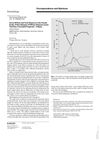 November 2022 in “Scientific Data”
November 2022 in “Scientific Data” The research identified genes and non-coding RNAs in cells that could be affected by testosterone, which may help understand hair loss and prostate cancer.
 February 2022 in “Research Square (Research Square)”
February 2022 in “Research Square (Research Square)” High TSPEAR levels in colorectal cancer predict worse outcomes.
 January 2022 in “Research Square (Research Square)”
January 2022 in “Research Square (Research Square)” High TSPEAR levels in colorectal cancer predict worse outcomes.
 April 2019 in “Molecular Informatics”
April 2019 in “Molecular Informatics” Researchers developed reliable models to predict how well certain compounds bind to androgen receptors, emphasizing the importance of atomic electronegativity.

The peer review highlighted the need for clearer data handling, questioned the study's validity, and recognized improvements from the original version.
 March 2009 in “Journal of The American Academy of Dermatology”
March 2009 in “Journal of The American Academy of Dermatology” AGA patients have higher rates of metabolic syndrome and carotid atheromatosis, suggesting early screening and prevention is important.
 February 2009 in “Journal of The American Academy of Dermatology”
February 2009 in “Journal of The American Academy of Dermatology” People with early-onset hair loss have higher risk of heart issues, so early screening is important.
 4 citations,
January 2021 in “Dermatologic Therapy”
4 citations,
January 2021 in “Dermatologic Therapy” AI is effective in diagnosing and treating hair disorders, including detecting hair loss and scalp conditions with high accuracy, but it should supplement, not replace, doctor-patient interactions.
 122 citations,
July 2005 in “The FASEB journal”
122 citations,
July 2005 in “The FASEB journal” Hair follicles produce and respond to melatonin, affecting hair growth and sensitivity to estrogen.
97 citations,
January 2006 in “Dermatology” imTA and pulse therapy are effective for alopecia areata with manageable side effects, but relapse rates need improvement.
74 citations,
November 2000 in “Archives of Dermatology” Salicylic acid can safely exfoliate and regenerate skin without causing inflammation.
 59 citations,
January 2002 in “Dermatology”
59 citations,
January 2002 in “Dermatology” A new type of sudden, complete female hair loss was found, with most patients fully recovering within 6 months without needing steroid treatment.
 46 citations,
May 2012 in “Molecular and Cellular Endocrinology”
46 citations,
May 2012 in “Molecular and Cellular Endocrinology” Human skin produces sex hormones like estrogen and testosterone, influenced by ARO and StAR, which may affect skin elasticity and hair growth.
 33 citations,
November 1994 in “Archives of Biochemistry and Biophysics”
33 citations,
November 1994 in “Archives of Biochemistry and Biophysics”  29 citations,
January 2003 in “Dermatology”
29 citations,
January 2003 in “Dermatology” The condition called 'acute diffuse and total alopecia of the female scalp' is actually a known condition named alopecia areata incognita.
 25 citations,
June 2014 in “Journal of Endocrinology/Journal of endocrinology”
25 citations,
June 2014 in “Journal of Endocrinology/Journal of endocrinology” Human sebaceous glands contain enzymes that affect androgen production and may influence sebum production and acne.
 23 citations,
February 2020 in “PLOS genetics”
23 citations,
February 2020 in “PLOS genetics” Mice with LSS deficiency showed hair loss and cataracts, similar to humans, and can help in understanding and treating this condition.
 20 citations,
January 2019 in “Journal of dermatological science”
20 citations,
January 2019 in “Journal of dermatological science” Male hormones indirectly affect skin cell development by increasing growth factor levels from skin fibroblasts.
 20 citations,
January 1994 in “Archives of Biochemistry and Biophysics”
20 citations,
January 1994 in “Archives of Biochemistry and Biophysics” Minoxidil needs specific structure to block lysyl hydroxylase; exploring alternatives may keep benefits without this effect.
13 citations,
March 2008 in “Journal of the European Academy of Dermatology and Venereology” Triamcinolone acetonide therapy for hair loss may cause a skin condition called linear lichen planus.
10 citations,
July 2014 in “Annals of Saudi Medicine” A 30-year-old man with rare skin conditions improved with antibiotics and surgery, hinting at a link to rosacea.
6 citations,
January 2018 in “Advances in experimental medicine and biology” Researchers created artificial human skin using special cells, which could help treat skin conditions like albinism and vitiligo.
4 citations,
February 2019 in “Breast Cancer Research and Treatment” DHL-HisZnNa may help reduce hair loss from chemotherapy, but more research is needed.
 1 citations,
August 2018 in “Journal of Investigative Dermatology”
1 citations,
August 2018 in “Journal of Investigative Dermatology” Muse cells keep their special features and can become different cell types even after being frozen and thawed three times.
 September 2004 in “Experimental dermatology”
September 2004 in “Experimental dermatology” Melatonin directly affects mouse hair follicles and may influence hair growth.
 April 2018 in “The journal of investigative dermatology/Journal of investigative dermatology”
April 2018 in “The journal of investigative dermatology/Journal of investigative dermatology” Androgens increase growth factors in skin cells, which may lead to acne.
June 2014 in “The Journal of Dermatology” A patient with a rare chromosome condition also had a rare type of hair loss.
 15 citations,
June 2011 in “British Journal of Dermatology”
15 citations,
June 2011 in “British Journal of Dermatology” No link found between aromatase gene and female hair loss.
 383 citations,
February 2011 in “Nature Reviews Genetics”
383 citations,
February 2011 in “Nature Reviews Genetics” DNA profiling in forensics has improved, but predicting physical traits and ancestry from DNA has limitations and requires ethical consideration.
 44 citations,
September 2014 in “Cell Death & Differentiation”
44 citations,
September 2014 in “Cell Death & Differentiation” Tumor suppressors help control inflammation in cancer and restoring their function could lead to new treatments.






















